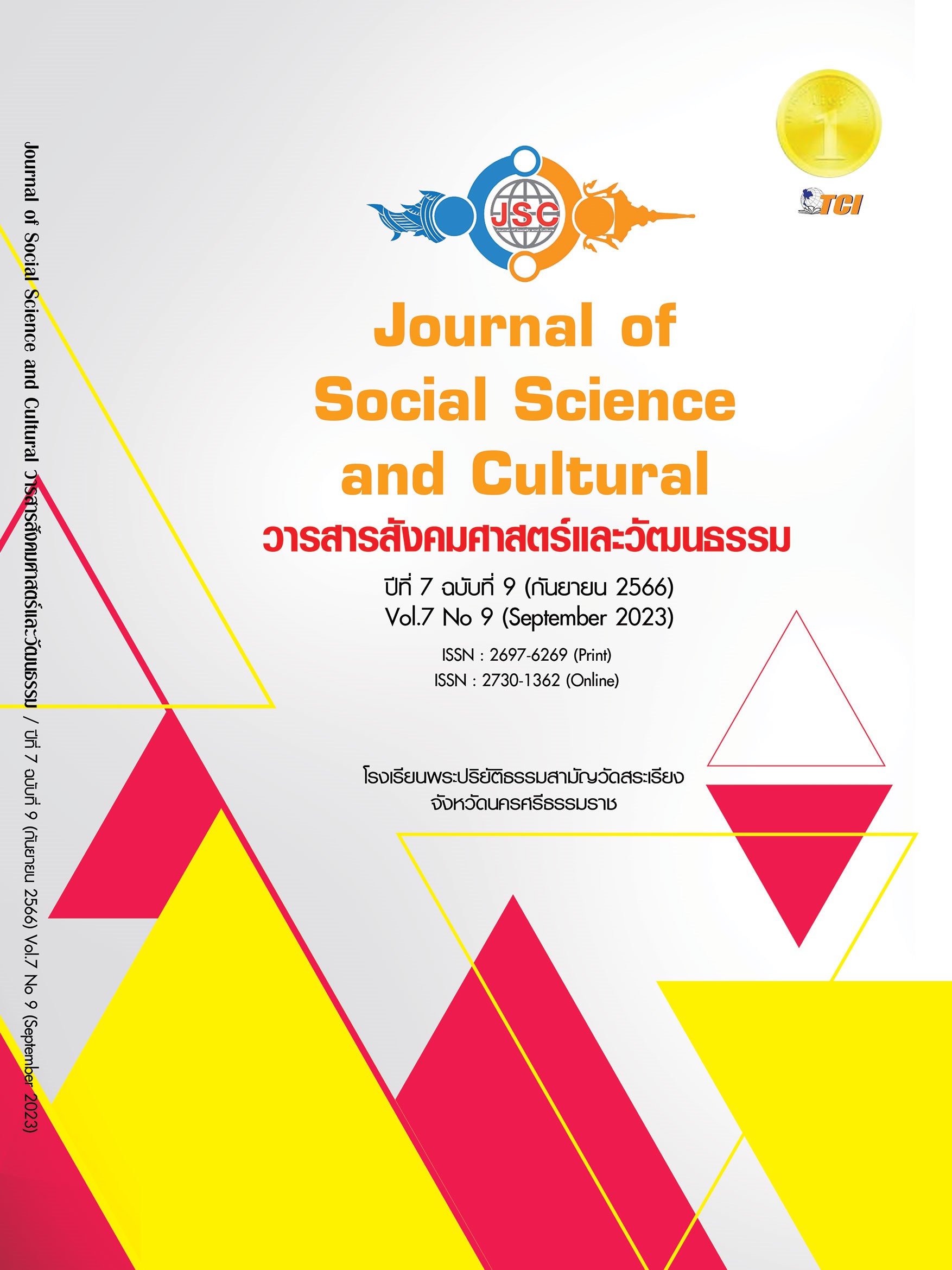การพัฒนาแบบจำลองสมรรถนะดิจิทัลสำหรับครูอาชีวศึกษา
Main Article Content
บทคัดย่อ
บทความวิจัยนี้มีวัตถุประสงค์เพื่อ 1) ศึกษาองค์ประกอบสมรรถนะดิจิทัลที่เหมาะสมสำหรับครูอาชีวศึกษา 2) พัฒนาแบบจำลองสมรรถนะดิจิทัลสำหรับครูอาชีวศึกษา และ3) ประเมินประสิทธิผลการใช้แบบจำลองสมรรถนะดิจิทัลสำหรับครูอาชีวศึกษา เป็นการวิจัยและพัฒนา (Research and Development : R&D) ดำเนินการ 3 ระยะ คือ ระยะที่ 1 : วิเคราะห์เอกสารและงานวิจัยที่เกี่ยวข้อง (Document Analysis) และศึกษาองค์ประกอบสมรรถนะดิจิทัลที่เหมาะสมสำหรับครูอาชีวศึกษา ด้วยเทคนิคการวิจัย EDFR โดย ผู้เชี่ยวชาญ จากการเลือกแบบเจาะจง (Purposive Sampling) จำนวน 21 คน ใช้แบบสอบถามกึ่งโครงสร้างและแบบสอบถามความคิดเห็นเพื่อยืนยันอนาคตภาพ พบว่า องค์ประกอบสมรรถนะดิจิทัลที่เหมาะสมกับครูอาชีวศึกษา มี 4 ด้าน คือ ความรู้(Knowledge) ทักษะ(Skills) คุณลักษณะ(Attribute) และการประยุกต์ใช้เทคโนโลยี(Technology Application) ระยะที่ 2 : การพัฒนาแบบจำลองสมรรถนะดิจิทัลสำหรับครูอาชีวศึกษา ยกร่างแบบจำลองสมรรถนะดิจิทัลสำหรับครูอาชีวศึกษา โดยวิธีการ 5 ขั้นตอนของ ADDIE ประกอบด้วย 5 องค์ประกอบ ดังนี้ 1) หลักการของแบบจำลอง 2) จุดประสงค์ของแบบจำลอง 3) กลุ่มเป้าหมาย 4) หลักสูตร และ5) การประเมินผล และผลตรวจสอบประสิทธิภาพแบบจำลอง โดยวิธีหาค่าประสิทธิภาพ E1/E2 สูงตามเกณฑ์ที่กำหนดไว้ที่ 75/75 เท่ากับ 76.47/85.10 และระยะที่ 3 : ประเมินประสิทธิผลการใช้แบบจำลองสมรรถนะดิจิทัลสำหรับครูอาชีวศึกษา โดยการเปรียบเทียบก่อน – หลังการอบรม ทดลองใช้จริงกับกลุ่มตัวอย่าง ได้แก่ ครูผู้สอนอาชีวศึกษา ในสังกัดอาชีวศึกษาจังหวัดนครศรีธรรมราช โดยการเลือกแบบเจาะจง (Purposive Selection) จำนวน 50 คน ใช้สถิติ Independent t -test เครื่องมือที่ใช้ในการเก็บรวบรวมข้อมูล ได้แก่ แบบทดสอบก่อน-หลังการอบรม และแบบประเมินความพึงพอใจ ผลการศึกษา พบว่า ผลการเปรียบเทียบสมรรถนะดิจิทัลหลังอบรมสูงกว่าก่อนอบรมอย่างมีนัยสำคัญทางสถิติที่ระดับ 0.01 และค่าดัชนีประสิทธิผล (E.I) มีค่าเท่ากับ 0.6121 และผลการประเมินความพึงพอใจ ภาพรวมอยู่ในระดับมากที่สุด
Article Details
เอกสารอ้างอิง
จีรศักดิ์ หมุนขำ. (2563). การศึกษารูปแบบการฝึกอบรมฐานสมรรถนะด้านการจัดการเรียนรู สำหรับครูผู้ช่วยในสถานศึกษาสังกัดสำนักงานคณะกรรมการการอาชีวศึกษา โดยวิธีการเรียนรูแบบมีส่วนร่วม. วารสารวิจัยราชภัฏกรุงเกา มหาวิทยาลัยราชภัฏพระนครศรีอยุธยา, 7(3), 49-56.
ญาณภัทร สีหะมงคล. (2563). การพัฒนาโปรแกรมเสริมสร้างสมรรถนะครูด้านการวัดและประเมินผลการเรียนรู้ในศตวรรษที่ 21 สำหรับสถานศึกษา สังกัดสถาบันการอาชีวศึกษา. วารสารชุมชนวิจัย มหาวิทยาลัยราชภัฏนครราชสีมา, 15(4), 169-181.
ดิเรก พรสีมา. (2554). แนวทางการพัฒนาวิชาชีพครู (เอกสารอัดสำเนา).
ปรัชญนันท์ นิลสุข. (2542). WBT: Web-based training เทคโนโลยีการฝึกอบรมครูในอนาคต. วารสารศึกษาศาสตร์ปริทัศน์ มหาวิทยาลัยเกษตรศาสตร์, 14(2), 79-88.
พิจิตรา ธงพานิช. (2561). การพัฒนาแบบจำลอง NPU Model: เพื่อส่งเสริมการพัฒนาหลักสูตรและนวัตกรรมการจัดการเรียนรู้. วารสารศิลปากรศึกษาศาสตร์วิจัย, 10(1), 61-71.
ภูเบศ เลื่อมใส. (2559). การพัฒนาแบบจำลองการฝึกอบรมสมรรถนะด้านเทคโนโลยีสารสนเทศ สำหรับครูสังกัดองค์การบริหารส่วนจังหวัดชลบุรี. วารสารศึกษาศาสตร์ มหาวิทยาลัยนเรศวร, 19(1), 248-259.
มะยุรีย์ พิทยาเสนีย์. (2563). แนวทางการพัฒนาสมรรถนะเทคโนโลยีดิจิทัลของนักศึกษาครูมหาวิทยาลัยราชภัฏ. วารสารมหาวิทยาลัยราชภัฏลำปาง, 9(1), 64-73.
วรากรณ์ สามโกเศศ และคณะ. (2553). ข้อเสนอระบบการศึกษาทางเลือกที่เหมาะสมกับสุขภาวะคนไทย. กรุงเทพมหานคร: ภาพพิมพ์.
สำนักงานเลขาธิการสภาการศึกษา. (2560). แผนการศึกษาแห่งชาติ พ.ศ. 2560 – 2579. กรุงเทพมหานคร: สำนักงานเลขาธิการสภาการศึกษา.
สำนักงานสภาพัฒนาการเศรษฐกิจและสังคมแห่งชาติ สำนักนายกรัฐมนตรี. (2565). แผนพัฒนาเศรษฐกิจและสังคมแห่งชาติ ฉบับที่ 13 (พ.ศ. 2566—2570). กรุงเทพมหานคร: สำนักนายกรัฐมนตรี.
Anderson, L. W., & Krathwohl, D. R. . (2001). A taxonomy for learning, teaching, and assessing: A revision of Bloom’s taxonomy of educational objectives. New York: Addison Wesley Longman.
Barr, M.J. & Keating, L.A. . (1990). “Introduction: Elements of Program Development,”Development Effective Student Services Program. San Francisco: Jossey- Bass.
Calvani, A. et al. (2009). Models and instruments for assessing Digital competence at school. Journal of E-learning and Knowledge Society, 4(3), 183-193.
McKinsey. (2007). McKinsey Report on Education. Retrieved March 1, 2014, from ttp//www.mckinsey.com


